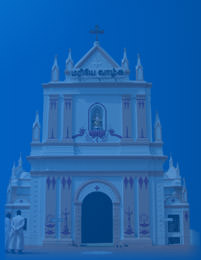Dear Fathers, Brothers, Sisters and my dear People,
In the Catholic Church the month of November begins with the solemnity of All Saints (1st November) followed by the commemoration of all the Faithful Departed (2nd November, All Souls Day). The whole month of November is dedicated to the Holy Souls in Purgatory. The Church commemorates all the faithful Children who have departed from this life, but have not yet attained the joys of heaven. Let us spend this month by offering Holy Masses for the Holy Souls in Purgatory, visiting the cemeteries and praying for them.
Last month the Synod of Bishops the XVI Ordinary General Assembly of Bishops took place in Rome. In this newsletter I would like to share some reflections on the Synod with the theme towards the Synodal Church through communion, participation and Mission. You also may be aware of the Dubia sent to the Pope by five cardinals and the response of the Pope and the strong opposition to the Synodal procedure from various quarters. Below I would like to share some of my reflection on the Synod on Synodality.
We need to thank God our Father for all the graces and blessings we receive everyday and every moment of our life, especially for the gift of life, for the gift of Christian faith and for the Church, the mystical body of Christ which He founded. When God called Abraham, he called him to be a blessing to all. Abraham, was the Father of the Synodal journey because he listened to God and walked the Way. So, we who are called by Him through Baptism, have to become a blessing to all who come into contact with us. We should not forget that by the virtue of the Sacrament of Baptism we participate in the mission of Jesus Christ. We are called together as one family as the people of God towards our heavenly home fulfilling the mission of Jesus. To continue this mission, Jesus called the twelve and commissioned them to carry on the mission, journeying together in communion and participation, listening to the Spirit and to each other. That is what we experience in the Acts 2:43-47. The early Christian community was journeying together in communion, participation and mission. Because of that the followers of Jesus were called those who follow the ‘WAY’.
The word ‘Synod’ comes from the Greek word ‘Syn’ and ‘hodos’. It simply means ‘together’ on the ‘path’, journeying together. As a Church, we are journeying together with the Holy Spirit and Jesus who is the ‘Way’. (Jn. 14:6). Jesus’ passion, death and resurrection gave rise to a movement of his disciples called the ‘WAY’ (Acts 9:2; 19:9; 22:4). This “WAY’ of people with diverse spiritual gifts and Charisms (1 Cor. 12) was filled with a deep sense of service and mission. They saw themselves as servants of the community. The Church by nature is Synodal from the beginning.
The origin of the Synod of Bishops goes back to a desire of the Second Vatican Council expressed in its document Lumen Gentium (21st November 1964) on the Church. The council desired greater involvement of the Bishops of the world in matters that concern the Universal Church. This desire is grounded on the understanding of the council that the Bishops are not just pastors of their dioceses but also co-responsible with the Pope for the life and government of the Church. To realize this desire of the council, Pope St. Paul VI established the new mechanism of the Synod of Bishops in the Church on 15th September 1965.
Some of the factors that made Pope Francis to convoke the council with the theme for the Synodal Church. 1. It is more than fifty-five years since the council ended, which underlined the notion of the Church primarily as the “People of God” replacing Pyramidal model of the Church. Yet in many aspects, the Church has continued to function, in effect a Pyramidal fashion. 2. The Pope wants the notion of Synodality applied to all aspects of the life of the Church. For example, Synodality in the area of Evangelization would mean that all the baptized whatever their position in the Church or their level of instruction in the faith, are agents of evangelization, and it would be insufficient to envisage a plan of evangelization to be carried out by professionals while the rest of the faithful would simply be passive recipients (E.G. 120). 3. There is a palpable disaffection when the expectations of Vat. II are not met in the practice of the Church and its administration, revealing a dissonance between the grand councilior vision of the Church as People of God and the ground reality. 4. There is also an unease regarding the centralized mode of administration and awareness about the disastrous situations it can bring about. Moreover, one could sense increasing disappointment with decisions taken arbitrarily without discernment and consultation by the clergy, telling upon the Church’s credibility and witnessing power. 5. The Global exposition of clerical sexual abuse, has made the world to question on how the Church of Christ could be trusted when managed by such clerics. We can sense a very powerful anti-clericalism opinion caused by sexual and financial scandals. 6. Also we live in our age in which people are increasingly by aware of their freedom, autonomy in every realm of life and conscious of their dignity. They have already passed from a pre-modern world where they let others decide for them, to a modern conception of the world in which they think and decide for themselves and hold their views and opinions. 7. There is also the theology of St. Paul which figured the Church as one body and indeed the body of Christ in which all the members are bound in a relationship of interdependence and each member is indispensable and play their unique role (1 Cor. 12:12-27) promotes this Synodality. There is no high and low which is a worldly and caste parameter view, but everyone is of equal dignity with different functions even as they are endowed with different Charisms and gifts.
Pope Francis and Synodality
Pope Francis hailing from Argentina, South America was as Archbishop of Buenos Aires, the Episcopal Adviser to the Catholic Charismatic Renewal in his country, seeing the Renewal divided into exclusive communities of Catholic fraternities; he worked hard to unify them. As he became the Pope he brought the whole Renewal ministries under one entity called “charis’ the current of grace.
As he became Pope he did not want to stay in the Papal Palace, but moved to “Domus Sanctae Marthae” with other Cardinals and Archbishops residing there as one among them, living in communion with others. With the desire of making the Church more Synodal he constituted the (C8) council of Cardinal Advisers with Cardinals from different parts of the world to advise him on vital matters.
Pope Francis’ style of leadership is strikingly Synodal. In his ‘Episcopalis communio’ of September 15, 2018, he wrote, the Synod of Bishops must increasingly became a privileged instrument for listening to the people of God; For the Synod Fathers, we ask the Holy Spirit first of all for the gift of listening; to listen to God, that with him we may hear the cry of the people; to listen to the people until breathing in the desire to which God calls us.
With Evangelii Gaudium in 2013, Pope Francis reminded each of us that we are ‘missionary disciples’ who must always “go forth” to the peripheries. Proclaiming that “Jesus Christ is the face of God’s mercy” (Misericordiae Vultus No.1), he wanted the Church not only to be “For the poor but to be poor” with its Priests and Bishops having the “smell of sheep”.
In 2015, describing God’s cosmos as “our common Home” in ‘Laudato si’, Pope Francis conducted Synods on the Family in 2014-2015 and drew up ‘Amoris Laetitia’ to tell people that there is joy in loving. Moreover, since the baptized are “Christians’, the anointed ones, in the Anointed One, Christ – ‘Rejoice and be Glad’ ‘Gaudete et exsultate’ (2018). There was a Synod for Youth in 2018 resulting in ‘Christus Vivit’ in 2019 followed by ‘Querida Amazonia’ in 2020 and ‘Fratelli Tutti’ which makes everyone sisters and brothers to be loved and served.
Speaking on the Occasion of the 50th anniversary of the institution of the Synod by Pope St. Paul VI, Pope Francis declared, “God wants the Church in the third millennium to walk the path of Synodality”. He invites us to go back to the praxis of the early Church. As the Holy Father explained, Synodality flows from what Vatican II taught us about the Church. We are all one family of the People of God. By our Baptism we become members of one family. No one is excluded. Christ intended them to be inclusive. In our region Tamil Nadu, the Church to be Synodal we need to work towards a casteless society. We need to listen to one another especially to those in difficulty, those who are suffering, those on the periphery and even those who have left the Church. Pope Francis calls us to make a beginning; to become a listening Church, a serving Church, a humble Church, a Church in which all participate, a Church where all go out in mission with dedication.
1. Very Rev. Fr. A. Louis
Very Rev. Fr. A. Louis @ Swami Gnana Jothi, the Acharia Guruji of Anjali Ashram, Mysore and Our Former Episcopal Vicar for Priests and the Religious died on 15-10-2023. In various capacities like assistant Parish priest, Parish priest, Spiritual Director, Episcopal Vicar for Priests and the Religious and the Acharia Guruji of Anjali Ashram, he did excellent pastoral ministries. The priests, parishioners, and the faithful had great love and esteem for him. We thank him for his devoted services to our Archdiocese for past 54 years and pray for the repose of his soul.











